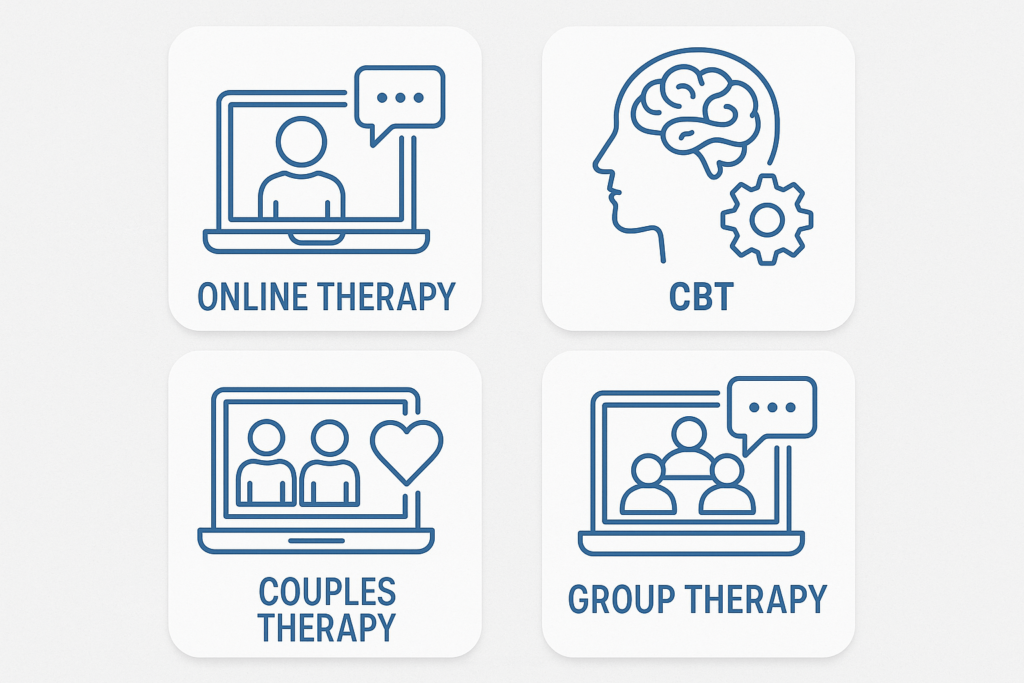Online Therapy: Complete Guide for 2025 – Everything You Need to Know
The landscape of mental health care has fundamentally shifted. Online therapy has evolved from an emergency pandemic solution to a preferred treatment method for millions of people seeking convenient, effective, and affordable mental health support.

If you’re considering virtual therapy but feeling overwhelmed by options, costs, and questions about effectiveness, you’re in the right place. This comprehensive guide covers everything you need to know about digital mental health care in 2025, from how it works to what it costs, and whether it’s as effective as traditional therapy.
With over 18 million Americans now using therapy services, understanding your options has never been more important. Let’s explore how this revolutionary approach to mental health care could transform your wellbeing.
What is Online Therapy and How Does It Work?
Online therapy, also known as teletherapy or virtual therapy, connects you with licensed mental health professionals through digital platforms. Unlike traditional therapy that requires in-person visits to a therapist’s office, virtual therapy provides professional mental health services through video calls, messaging, or phone sessions.
Types of Online Therapy Formats
Video Sessions: The closest alternative to face therapy, video sessions allow real-time interaction with your therapist through secure video conferencing. You can see facial expressions, body language, and maintain the personal connection of traditional therapy while enjoying the convenience of staying home.
Text-Based Therapy: Communicate with your therapist through secure messaging platforms. This format works particularly well for people who express themselves better in writing or have busy schedules that make live sessions challenging.
Phone Therapy: Audio-only sessions provide a middle ground between text and video, offering real-time conversation without the need for camera setup or strong internet connections.
Hybrid Approaches: Many therapy platforms combine multiple formats, allowing you to switch between video, text, and phone based on your needs and circumstances.
How Online Therapy Sessions Work
Initial Assessment: Your therapy journey begins with a comprehensive intake assessment. This process helps match you with a licensed therapist who specializes in your specific mental health concerns, whether that’s anxiety, depression, trauma, or relationship issues.
Platform Setup: Once matched, you’ll receive access credentials to a secure, HIPAA-compliant therapy platform. These systems protect your privacy while providing easy-to-use interfaces for scheduling sessions and communicating with your therapist.
Regular Sessions: Online sessions typically last 45-50 minutes, similar to traditional therapy. You can schedule sessions at convenient times, often including evenings and weekends that aren’t available with in-person providers.
Between-Session Support: Many online platforms offer additional support between sessions, including messaging capabilities, homework assignments, and access to educational resources.
Online Therapy vs Traditional Therapy: A Complete Comparison
Understanding the differences between online therapy and face therapy helps you make an informed decision about which approach best serves your mental health needs.

Accessibility and Convenience
Online Therapy Advantages:
- Access therapists regardless of geographic location
- No commute time or transportation costs
- Flexible scheduling, including evenings and weekends
- Comfortable, familiar environment for sessions
- Easier to maintain consistency with irregular schedules
Traditional Therapy Advantages:
- Full range of non-verbal communication cues
- Established therapeutic setting free from home distractions
- Some therapeutic techniques work better in person
- No technology barriers or connectivity issues
Cost Comparison
Online Costs:
- Average range: $60-$120 per session
- Many platforms offer subscription models ($240-$400/month)
- Lower overhead costs often translate to more affordable options
- Reduced indirect costs (no transportation, parking, time off work)
Traditional Therapy Costs:
- Average range: $100-$200 per session
- Additional costs for transportation and time off work
- Limited affordable options in many geographic areas
- Insurance coverage similar to online therapy
Effectiveness Research
Recent studies demonstrate that online therapy can be as effective as traditional therapy for many mental health conditions. Research published in the Journal of Medical Internet Research found comparable outcomes between online and in-person therapy for treating anxiety and depression.
Conditions Where Online Therapy Excels:
- Anxiety disorders
- Depression
- PTSD and trauma recovery
- Cognitive behavioral therapy (CBT) applications
- Relationship counseling
When Traditional Therapy May Be Preferred:
- Severe mental health crises requiring immediate intervention
- Complex trauma requiring specialized in-person techniques
- Individuals who struggle with technology
- Cases requiring physical presence for safety assessment
Types of Online Therapy and Therapeutic Approaches
Online platforms offer various therapeutic modalities adapted for digital delivery, ensuring you receive evidence-based treatment regardless of format.

Cognitive Behavioral Therapy (CBT) Online
CBT therapy online has proven particularly effective in digital formats. The structured, homework-based nature of CBT translates well to online platforms, allowing therapists to assign exercises, track progress, and provide feedback between sessions.
Online CBT typically includes:
- Thought record worksheets delivered digitally
- Behavioral activation assignments tracked through apps
- Exposure therapy guided through video sessions
- Mindfulness exercises and meditation resources
Specialized Online Therapy Services
Therapy for Teens: Adolescents often prefer digital communication, making online therapy a natural fit for teenage mental health needs. Specialized teen platforms offer age-appropriate interfaces and therapists trained in adolescent development.
Couples Therapy Online: Virtual couples therapy allows partners to attend sessions together from home, often creating a more comfortable environment for difficult conversations. Therapists use specialized techniques adapted for video sessions.
Group Therapy Online: Online platforms increasingly offer group sessions, providing peer support and shared experiences while maintaining the convenience of digital access.
Evidence-Based Therapeutic Approaches
Licensed therapists providing online therapy use the same evidence-based approaches as traditional therapy:
- Dialectical Behavior Therapy (DBT) adapted for video and messaging
- Eye Movement Desensitization and Reprocessing (EMDR) modified for online delivery
- Acceptance and Commitment Therapy (ACT) enhanced with digital tools
- Psychodynamic therapy adapted for video session formats
How to Choose the Right Online Therapy Platform
With numerous online platforms available, selecting the right one requires careful consideration of your specific needs, budget, and preferences.

Essential Features to Look For
Therapist Credentials: Verify that all therapists are licensed in your state and have appropriate training for your specific mental health concerns. Quality platforms provide detailed therapist profiles including education, specializations, and years of experience.
Platform Security: Ensure the platform uses HIPAA-compliant security measures, including end-to-end encryption for all communications. Your mental health information deserves the highest level of privacy protection.
Response Times: Understand the platform’s response time guarantees for different communication methods. Some platforms offer same-day responses for urgent concerns, while others may take 24-48 hours.
Insurance Coverage: Many online therapy platforms now accept major insurance plans. Verify coverage before starting treatment to understand your out-of-pocket costs.
Red Flags to Avoid
- Unlicensed providers or vague credential information
- Platforms without proper security certifications
- Unrealistic promises about treatment outcomes
- Pressure to commit to long-term contracts immediately
- Poor customer service or technical support
Popular Online Therapy Platforms Comparison
Talkspace:
- Offers text, video, and audio therapy options
- Accepts many insurance plans
- Specialized programs for teens, couples, and specific conditions
- Starting prices around $69/week
BetterHelp:
- Largest online therapy platform with extensive therapist network
- Multiple communication options
- Financial aid available for qualifying users
- Pricing ranges from $60-$90/week
The Empowering Space:
- Specialized focus on millennial mental health needs
- Affordable options starting at $35/week with trained interns
- Licensed therapists in Texas and Ohio
- Integration of text, video, and specialized therapy approaches
Online Therapy Insurance Coverage and Costs
Understanding the financial aspects of online therapy helps you make informed decisions about your mental health investment.

Insurance Coverage for Online Therapy
Major Insurance Plans: Most major insurance providers now cover online at the same rate as traditional therapy. Covered plans typically include:
- Blue Cross Blue Shield
- Aetna
- Cigna
- United Healthcare
- Humana
- Medicare (for eligible services)
Employer Benefits: Many employers offer online therapy through Employee Assistance Programs (EAPs) or mental health benefits. These programs often provide free or heavily discounted access to online therapy platforms.
Medicaid Coverage: Online therapy that takes medicaid varies by state, but coverage is expanding rapidly. Check with your state’s Medicaid program for current therapy coverage options.
Out-of-Pocket Costs
Subscription Models: Many platforms offer weekly or monthly subscription rates:
- Basic text therapy: $60-$80/week
- Text plus video sessions: $80-$120/week
- Unlimited messaging: $240-$400/month
Per-Session Pricing: Some platforms offer pay-per-session options:
- Individual video sessions: $60-$100 each
- Specialized therapy sessions: $80-$150 each
- Group therapy sessions: $30-$60 each
Free and Low-Cost Options
Online Therapy Free Options:
- Crisis text lines (741741) for immediate support
- Community mental health center online programs
- University training clinics offering supervised therapy
- Non-profit organizations providing free therapy
Sliding Scale Programs: Many online platforms offer financial assistance:
- Income-based pricing adjustments
- Student discounts
- Military and veteran benefits
- Healthcare worker support programs
Is Online Therapy Effective? What the Research Shows
Scientific evidence consistently demonstrates that online can be as effective as face therapy for many mental health conditions.
Clinical Research Findings
Meta-Analysis Results: A comprehensive review of 92 studies published in the Journal of Anxiety Disorders found that online therapy produced significant improvements in anxiety and depression symptoms, with effect sizes comparable to traditional therapy.
Long-Term Outcomes: Research tracking patients over 12 months showed that gains from online therapy were maintained at the same rate as traditional therapy, suggesting lasting treatment benefits.
Patient Satisfaction: Studies consistently show high satisfaction rates with online therapy, often exceeding satisfaction with traditional therapy due to increased convenience and accessibility.
Effectiveness by Condition
Highly Effective Online:
- Generalized anxiety disorder
- Social anxiety
- Depression
- PTSD and trauma recovery
- Obsessive-compulsive disorder
- Eating disorders (with medical oversight)
Moderately Effective Online:
- Bipolar disorder (with medication management)
- Personality disorders
- Substance abuse recovery
- Complex trauma requiring specialized techniques
May Require In-Person Care:
- Active psychosis or severe mental health crises
- Immediate suicide risk
- Severe eating disorders requiring medical monitoring
- Some complex trauma cases
Success Factors for Online Therapy
Client Factors:
- Comfort with technology
- Reliable internet connection
- Private space for sessions
- Motivation for self-directed work between sessions
Therapist Factors:
- Specialized training in online therapy delivery
- Experience adapting techniques for digital formats
- Strong communication skills for virtual relationships
- Familiarity with digital therapy tools and resources
Getting Started with Online Therapy: Step-by-Step Guide
Ready to begin your journey? This comprehensive guide walks you through each step of the process.
Step 1: Assess Your Needs
Identify Your Goals:
- What specific mental health concerns do you want to address?
- Are you looking for short-term support or long-term therapy?
- Do you prefer structured approaches like CBT or exploratory therapy?
- Would you benefit from individual, couples, or group therapy?
Evaluate Your Preferences:
- Do you communicate better through video, text, or phone?
- What times of day work best for therapy sessions?
- How much can you budget?
- Do you need a therapist with specific cultural or identity expertise?
Step 2: Research Platforms and Therapists
Platform Comparison: Compare features, costs, and therapist availability across multiple platforms. Read reviews and verify that platforms meet your specific needs for communication methods and scheduling flexibility.
Therapist Matching: Look for licensed therapists with:
- Appropriate credentials for your state
- Experience treating your specific concerns
- Training in online therapy delivery
- Communication style that matches your preferences
Step 3: Initial Consultation
Consultations: Many platforms offer initial consultations to assess fit between you and potential therapists. Use this opportunity to:
- Discuss your goals and concerns
- Ask about the therapist’s approach and experience
- Clarify logistics like scheduling and communication preferences
- Address any questions about the online therapy process
Step 4: Setting Up for Success
Technical Preparation:
- Test your internet connection and video/audio quality
- Choose a private, comfortable space for sessions
- Download necessary apps or software
- Set up good lighting and camera positioning for video sessions
Mental Preparation:
- Set realistic expectations for the therapy process
- Prepare to be actively engaged in your treatment
- Consider how you’ll apply therapeutic insights between sessions
- Think about your support system outside of therapy
The Future of Online Therapy
Online therapy continues evolving with technological advances and changing mental health needs, promising even more accessible and effective treatment options.

Emerging Technologies
Artificial Intelligence Integration: AI-powered tools are beginning to enhance online therapy through:
- Improved therapist-client matching algorithms
- Real-time mood and progress tracking
- Personalized homework assignments and resources
- Crisis detection and immediate intervention capabilities
Virtual Reality Therapy: VR technology enables new treatment approaches:
- Exposure therapy for phobias and anxiety in controlled virtual environments
- Immersive relaxation and mindfulness experiences
- Social skills training in virtual settings
- Enhanced treatment for trauma and PTSD
Wearable Technology Integration: Smartwatches and fitness trackers provide therapists with additional data:
- Sleep pattern monitoring for depression treatment
- Heart rate variability for anxiety management
- Activity levels for behavioral activation therapy
- Medication adherence tracking
Expanding Access
Global Reach: Expanding international availability, connecting people with therapists across borders while respecting local licensing requirements.
Specialized Populations: New platforms focus on specific demographics:
- LGBTQ+ focused services
- Cultural and language-specific therapy options
- Therapy for specific professions (healthcare workers, military, etc.)
- Age-specific platforms for children, teens, and seniors
Integration with Healthcare: Increasingly integrated with primary healthcare:
- Collaboration between therapists and medical providers
- Mental health screening in primary care settings
- Coordinated treatment for mental and physical health conditions
- Seamless referrals between different levels of care
Online Therapy at The Empowering Space
The Empowering Space recognizes that modern mental health care needs modern solutions. Our online therapy services are specifically designed for busy professionals, students, and anyone seeking flexible, effective mental health support.
Our Specialized Approach
Millennial-Focused Care: Our licensed therapists understand the unique challenges facing today’s young adults:
- Career pressure and workplace stress
- Student debt and financial anxiety
- Social media impact on mental health
- Relationship challenges in the digital age
- Life transitions and delayed milestones
Flexible Formats: We offer multiple online therapy options to fit your lifestyle:
- Video sessions for face-to-face connection
- Text-based therapy for busy schedules
- Phone sessions for privacy or convenience
- Hybrid approaches combining multiple formats
Evidence-Based Treatment: Our therapists use proven approaches adapted for online delivery:
- CBT therapy online for anxiety and depression
- Trauma-informed care for PTSD and complex trauma
- Mindfulness-based interventions for stress management
- Solution-focused therapy for specific goals
Affordable and Accessible Options
Pricing That Works:
- Intern therapists: Starting at $35/week
- Licensed therapists: $65-$85/week
- Insurance accepted for most major plans
- Sliding scale options for financial hardship
Texas and Ohio Coverage: Our licensed therapists provide services to residents of Texas and Ohio, ensuring compliance with state licensing requirements while offering convenient online access.
Quick Start Process:
- Consultation to assess fit
- Same-week therapist matching
- Flexible scheduling including evenings and weekends
- 24-hour response guarantee for urgent concerns
Integration with Comprehensive Care
Specialized Services:
- Anxiety and depression
- Trauma-focused approaches
- Couples therapy adapted for virtual sessions
- Group therapy options for peer support
Seamless Care Coordination:
- Integration with medication management services
- Collaboration with primary care providers
- Referrals to specialized treatment when needed
- Ongoing progress monitoring and adjustment
Conclusion: Is Online Therapy Right for You?
Online therapy has transformed from an emergency alternative to a preferred treatment method for millions of people seeking convenient, effective, and affordable mental health care. The research is clear: for many conditions and individuals, it provides outcomes comparable to traditional therapy while offering significant advantages in accessibility and convenience.

Online Therapy is Ideal If You:
✅ Have busy or unpredictable schedules that make regular appointments challenging
✅ Live in areas with limited mental health provider availability
✅ Prefer the comfort and privacy of your own space
✅ Are comfortable with technology and digital communication
✅ Want more affordable mental health care options
✅ Are dealing with anxiety, depression, or trauma
✅ Value flexibility in communication methods and timing
Consider Traditional Therapy If You:
❌ Are experiencing severe mental health crises requiring immediate intervention
❌ Prefer in-person interaction and find technology barriers frustrating
❌ Need specialized techniques that work better in person
❌ Have complex trauma requiring intensive, specialized treatment
❌ Want the structured environment of a therapy office
Making Your Decision
The choice between online and traditional therapy isn’t permanent. Many people start with online for convenience and later transition to in-person sessions for specific needs, or use a hybrid approach combining both formats.
What matters most is taking the first step toward mental health support. Whether that’s through online therapy, traditional therapy, or a combination of approaches, seeking professional help is a sign of strength and self-awareness.
Ready to explore online therapy for yourself? The Empowering Space offers specialized online therapy services designed for modern life. Our licensed therapists understand the unique challenges you’re facing and provide evidence-based treatment through convenient, secure digital platforms.
Start your journey today with a consultation. Discover how flexible, effective mental health care can fit seamlessly into your life and support your goals for wellbeing and growth.
Your mental health deserves professional support that works with your life, not against it. Online therapy might be the key to accessing the care you need, when you need it, in a format that feels comfortable and sustainable for your unique situation.






